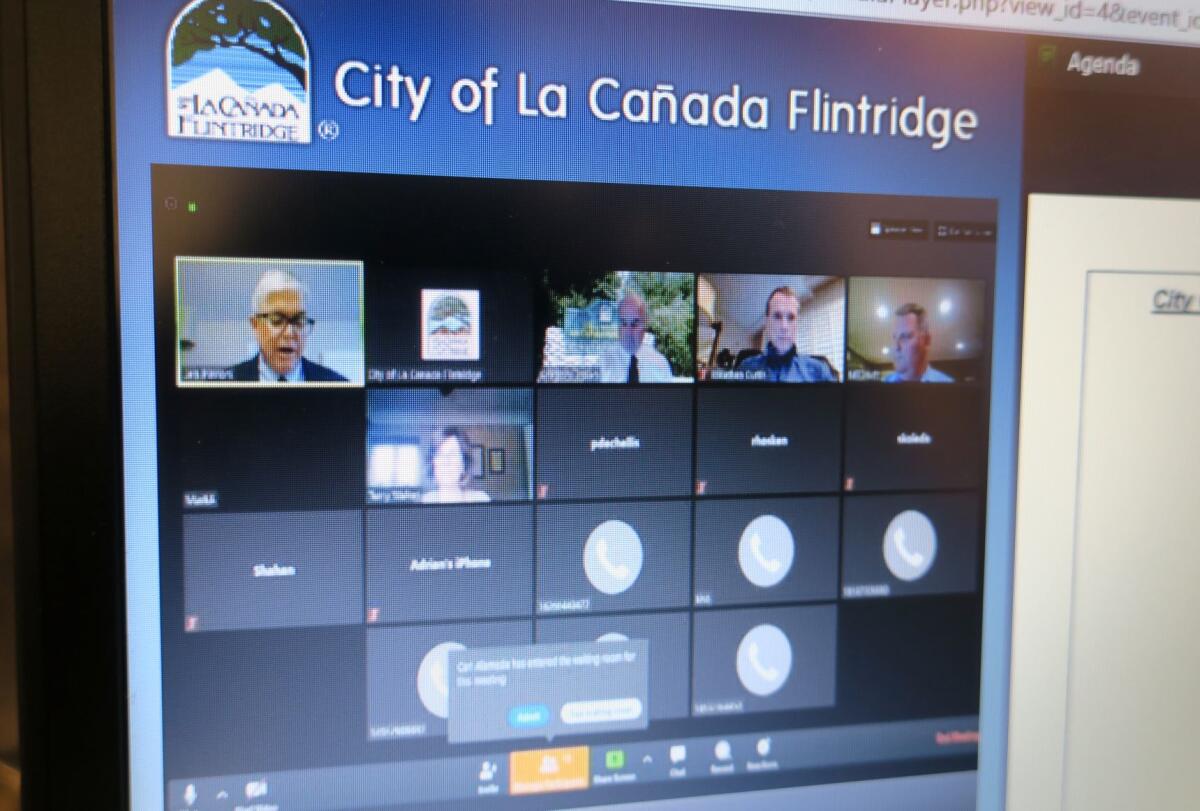La Cañada declares local coronavirus emergency as 8 cases counted in city

- Share via
As the number of novel coronavirus cases in the La Cañada Flintridge reporting area rose this week to eight, the City Council declared a local emergency Tuesday and examined how the city might assist community members most impacted during the pandemic.
City Manager Mark Alexander, acting as director of Emergency Services, on March 25 proclaimed a local emergency, “due to conditions of extreme peril to the health and safety of persons arising within the city as a result of the spread of the 2019 novel coronavirus.”
The council ratified the declaration Tuesday, adopting a resolution that allows for recovery assistance under the California Disaster Assistance Act and can expedite state and federal disaster relief programs.
The move comes as news of local transmissions grows, including the death of La Cañada resident Sharon Seiler, 60, who set up a telemedicine call with a doctor after experiencing cold symptoms but was not referred for treatment and died in her sleep Monday, CBS Los Angeles News reported Tuesday.
Due to a change in the county’s reporting procedures, novel coronavirus cases occurring in La Cañada Flintridge are now counted separately from unincorporated La Crescenta and Montrose, which currently have no reported cases.
While the city of Glendale has 86 cases, a rate of nearly 43 in 100,000 residents, La Cañada’s rate is similarly high, multiplied out at 39 per 100,000, a fact Mayor Pro Tem Greg Brown found startling.
“We’re in the top 10% on a per-capita basis,” he said. “We have eight [cases], which for our population is pretty high.”
The panel discussed the merits of passing urgency ordinances designed to halt price and rent gouging inside city limits, as well as the eviction of commercial tenants during the crisis.
City Atty. Adrian Guerra defined price-gouging as sellers or landlords charging more than 10% of prices normally charged when in an emergency, unless they can prove their own costs similarly increased.
A local ordinance could fine offenders $1,000 per violation or punish the act as a misdemeanor offense.
Although state law prohibits price gouging in the 30 days immediately following a state-declared emergency — investigated at the discretion of the district attorney’s office — a city ordinance could be enforced more quickly by the sheriff’s department and the city prosecutor.
“While we do think this is a good tool, the question is does it make sense for La Cañada Flintridge,” Guerra posed.
Councilwoman Terry Walker said an ordinance might help send a message about the city’s intolerance of such practices. Others expressed concern it might overtax city employees and be just as difficult to prosecute, since a two-month discontinuation of all state civil and criminal trials was announced last week.
“If the city prosecutor did step in, the courts are closed,” Brown said.
The council decided not to act and instead monitor the situation to see if local complaints arose.
They took a similar tack on another urgency ordinance that would have halted the no-fault eviction of commercial tenants unable to pay rent due to a decrease in businesses during the coronavirus outbreak.
Brown supported the concept of business owners not having to bear the full brunt of a decline in business but wondered how potential lost rent would be recovered with no mechanism in the ordinance. Councilman Jon Curtis found the law too intrusive.
“I just worry about going in and interfering with normal commercial operations,” he said. “You’ve got to be fair to the landlord. The landlord has property bills, property taxes, they have loans. It just goes too far for me.”
To assist “essential” La Cañada businesses still operating despite reductions in hours, services and staff, council members suggested temporarily easing parking and signage restrictions to allow for increased visibility during the pandemic.
They also favored city staff working with the local chamber of commerce to create a list for consumers of open businesses and services in town.
Brown suggested small business owners interested in receiving economic stimulus funds available from the state or federal government research options now.
“Few really ought to be encouraging our small businesses to … find out what to do and get those requests in quickly so they’re at the head of the line,” he said.

